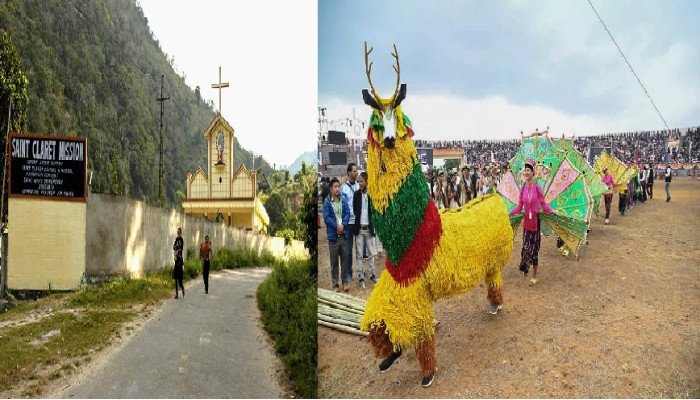Arunachal Pradesh at a Crossroads: Religion, Identity, and a Growing National Concern
Arunachal Pradesh, one of India’s most culturally rich and strategically sensitive states, is now at the center of a raging national debate. A recent viral video has reignited old tensions, showing members of the Arunachal Christian Forum (ACF) publicly declaring Arunachal as a “Christian State”—a statement that has set off alarm bells across the country.
A Viral Video and a Bigger Question
In the now-controversial footage, thousands of individuals are seen pledging allegiance to Christianity, sparking fears of systematic religious conversion. Critics argue this is not just a religious issue—it’s a cultural, civilizational, and national security challenge, especially in a border state that shares a long and disputed frontier with China.
Observers have pointed out that similar patterns have unfolded in other northeastern states, where the surge of Christian conversions was often followed by the rise of separatist movements demanding independence from India.
Legal Framework Ignored?
At the heart of the controversy lies a law that’s been gathering dust: the Arunachal Pradesh Freedom of Religion Act (APFRA), 1978. This legislation explicitly prohibits forced or fraudulent conversions, prescribing a two-year jail term and fines up to Rs. 10,000. It also requires mandatory reporting of all conversions to the local administration.
However, despite being on the books for decades, successive governments have failed to enforce this law effectively, allowing loopholes and social pressure tactics to flourish in the shadows.
The ACF’s Stand—and a Hunger Strike
The Arunachal Christian Forum has opposed the implementation of APFRA, claiming it would create societal friction and potentially provoke Manipur-like unrest. In February 2025, they staged an eight-hour hunger strike and announced a demonstration outside the State Assembly on March 6 to voice their resistance. Their message was clear: enforcing this law, in their view, undermines religious freedom.
Government’s Firm Response
Chief Minister Pema Khandu, leading the BJP government in Arunachal, has stood firm. In multiple public statements, he has reiterated that the law is not anti-Christian but rather pro-indigenous, aimed at protecting the cultural and spiritual identity of tribal communities.
In a move widely seen as a cultural safeguard, his government established the Department of Indigenous Faiths and Cultural Affairs in 2017. The department’s focus includes documentation, promotion, and preservation of the unique religious traditions of Arunachal’s diverse tribes.
Meanwhile, Home Minister Mama Natung has opened dialogue with ACF leaders. While discussions continue, no formal agreement has been reached.
Why This Matters: Culture, Security, and Unity
The situation unfolding in Arunachal Pradesh is more than just a local issue. It brings into sharp focus the delicate balance between religious freedom and cultural preservation, especially in states with rich tribal traditions and complex geo-political positioning.
As India looks to preserve the unity of its northeastern frontier, many now see Arunachal as a test case: Can the nation protect its indigenous roots without infringing on individual faith? Or are we headed toward deeper identity fractures in the name of belief?

